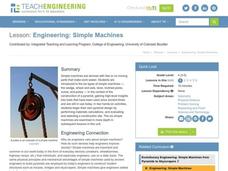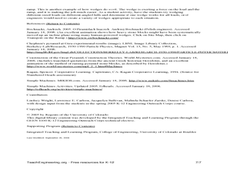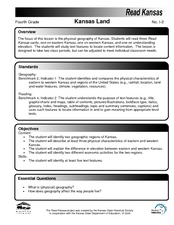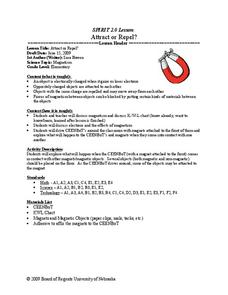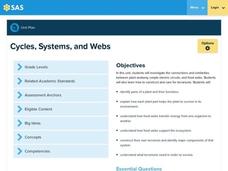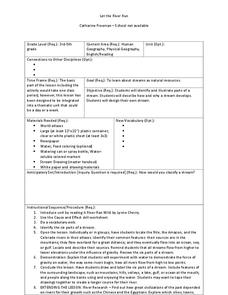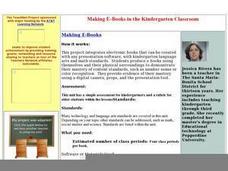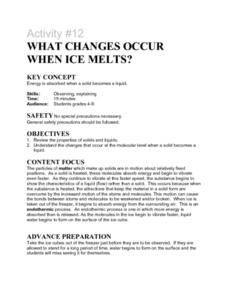Curated OER
Readings in Hudson River Natural History
Reading and understanding informational text is a key element to understanding every discipline. Elementary learners read three different articles focused on various animals and habitats in the Hudson River. They answer comprehension...
Curated OER
Water Cycle
Identify and interpret the earth's different water sources. Third and fourth graders describe and demonstrate the process of the water cycle, make a model of its two main parts, and predict and infer to answer questions about the model.
American Farm Bureau Foundation for Agriculture
Welcome to My American Farm!
Take a step into the virtual farm world and explore the impact farming has on our everyday eating habits. Future farmers discover the meaning of agriculture and the hard work that goes into providing food for us to enjoy. A computer game...
Curated OER
Wetland Metaphors
Students describe the characteristics of wetlands and identify their ecological functions. They inspect items and use them to create metaphors about wetlands.
Institute of Electrical and Electronics Engineers
Adaptive Device Design
After reading about how engineering has made adaptive devices possible for people with disabilities, pupils work in groups to discuss different devices to determine whether or not they are adaptive. They also disassemble a pair of...
Curated OER
Weather Challenge
For this identifying the weather terms activity, students read phrases about the weather and choose the term being described. Students choose 11 multiple choice answers.
Curated OER
Conserving Water through Art!
Young scholars study water conservation. In this water conservation lesson, students investigate the scarcity of water and determine reasons for conserving water. Young scholars estimate how much water they use in one day and identify...
Curated OER
Simple Machines
Students create a pyramid design based on the 6 simple machines that they are introduced to. In this simple machines lesson plan, students are introduced to the wedge, wheel and axle, inclined plane, screw, and pulley.
Curated OER
Spuds in Space
Students explore the effects of velocity on an object when it collides with another object. They design and outfit a potato astronaut in a spacesuit to withstand the hazards of high velocity impacts from space debris and meteoroids.
Curated OER
Where Do I Live?
Young scholars gain a better understanding of the population of the region they live in by comparing U.S. census data on the internet.
Curated OER
Pyramid Building: How to Use a Wedge
Students explore the simple machine of a wedge. In this wedge lesson, students test wedges on different materials including wax, soap, clay and foam. They learn how a wedge was used to build the ancient pyramid and modern day skyscrapers.
Curated OER
Kansas Land
Fourth graders discover the geographic regions of Kansas. In this geography lesson, 4th graders explore the different regions of Kansas and determine how the different geography affects daily life in Kansas.
Curated OER
Magnifiers
Students describe how several different objects magnify a provided sentence and decide if they are good magnifiers or not. They then write a sentence describing two properties an object must have in order to be a good magnifier.
Curated OER
Attract or Repel?
Students explain why some objects attract and some do not. In this physics activity, students investigate the magnetic properties of objects using CEENBoT. They give some important applications of magnets.
Curated OER
Building a Terrarium System
Students create their own terrariums. In this ecological model lesson, students create terrariums using soil, seeds, pebbles, and two liter bottles. Students compare the elements of a terrarium to a food web.
Pennsylvania Department of Education
Cycles, Systems, and Webs
Fourth graders review the parts of the plant and their functions. In this plant instructional activity, 4th graders recognize that plants must transfer energy to make food. Students understand the interdependence of organisms in an...
Pennsylvania Department of Education
The Digestive System
Fourth graders simulate how the digestive system works. In this hands-on simulation, 4th graders complete six group activities that help students visualize how our body breaks down food into nutrients.
Curated OER
Endangered Animals: Hawaii
Students locate regions in Hawaii where specific endangered animals live. They describe habitats, identify reasons why the species has become endangered, consider how a healthy environment for wildlife contributes to a healthy...
Curated OER
Theobroma - Food of the Gods
Students discuss the history of cacao and its use in the production of chocolate. They analyze actual cacao pods and record their observations. Finally they create a five minute contour drawing of the cacao pod and seeds.
Curated OER
Let the River Run
Young scholars explore the environment by reading a story in class. In this water formation lesson plan, students define environmental terms such as rivers, streams, gulf, oceans and lakes. Young scholars read the story A River Ran Wild...
Curated OER
Making E-Books in the Kindergarten Classroom
Students produce e-books using themselves and their physical surroundings to demonstrate content standards, such as number sense or color recognition. They provide evidence using a digital camera, props, and the presentation tool.
Curated OER
Mussel Identification Activity
Students identify given species of animals, such as various
mussels, by sets of physical characteristics as they use a key. They also read about mussels on the Illinois River and look at mussel species in the online database. Finally,...
Curated OER
Dino Dung!
Students examine how there is more to poop than they think! After reading through material, they answer a series of questions on coprolite, and explore the diet and physical attributes of dinosaurs, as well as their environment.
Curated OER
What Changes Occur When Ice Melts?
Students explore the physical process of melting. They observe melting ice and answer questions related to energy transfer during phase changes.









